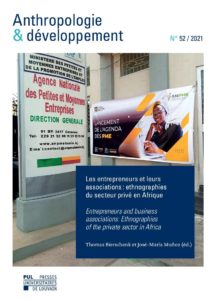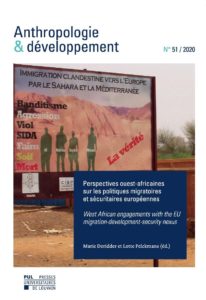Présentation
The journal Anthropology & Development is a peer-reviewed journal. Anthropologie & développement publishes two issues per year, alternating thematic special issues and varia issues. The thematic special issues are devoted to a particular theme, taking stock of a specific area in the field of development or social change. The Editorial Board welcomes proposals of special issues. Varia issues are composed of articles on any topic relevant to the journal’s remit, with a maximum length of 50,000 characters. Anthropologie & développement also publishes book reviews and thesis abstracts. These contributions may be solicited by the Editorial Board, but authors can also submit relevant proposals. They should not exceed 2,000 words.
Since the creation of APAD in 1991, the APAD Bulletin, recognized by the AERES in its “anthropology and technology” lists since 2007, has become a respected reference in development socio-anthropology. In 36 issues, it has contributed to the development of new themes, opened its pages to young researchers and has helped to decompartmentalize reflection between social scientists and development practitioners. Its articles are widely used in teaching and training, both in Africa and in Europe.
As of 2013, the APAD Bulletin became Anthropology & Development, the APAD Journal. Self-published by APAD from 2013 to 2018, the journal is now published by the Presses Universitaires de Louvain.
Anthropologie & développement is a bilingual peer-reviewed journal, indexed by ERIH PLUS and JournalBase (CNRS) (HCERES no longer publishes a list in social sciences). It has a focus on sub-Saharan Africa, but articles on development policies and practices can cover any geographical area.
Anthropologie & développement is distributed to members and sold to non-members online (here up to n°48-49 and here from n°50). The articles published in the journal are available after six months on the dedicated websitehttp://anthropodev.revues.org/?lang=fr ofRevues.org, one of the platforms of the OpenEdition portal dedicated to hosting electronic resources in the humanities and social sciences. Articles published in the APAD Bulletin remain available on https://apad.revues.org/?lang=fr.
In 2017, on OpenEdition, the Bulletin de l’APAD and Anthropologie & développement together received 174,000 individuals visitors, 240,000 total visits and 409,000 page views. For its first year online in 2017, Anthropologie & développement received nearly 30,000 individual visitors.
In 2021, Anthropologie & développement received more than 50 000 individual visitors, with 145 000 page views. Together with the Bulletin, its 200 000 individual visitors and more than 600 000 page views.
Contact: revue@apad-association.org
Sylvie Ayimpam
(IMAF, Aix-en-Provence, France)
Thomas Bierschenk
(Université Mainz, Allemagne)
Giorgio Blundo
(EHESS, Marseille, France)
Jacky Bouju
(AMU, CEMAF, Aix-en-Provence, France)
Laurence Boutinot
(CIRAD, Montpellier, France)
Mirjam de Bruijn
(ASC, Leiden, Pays-Bas)
Ann Cassiman
(Faculty of Social Sciences, Leuven, Belgique)
Jean-Pierre Chauveau
(IRD, Montpellier, France)
Jean Copans
(Université Paris Descartes, Paris, France)
Abdou Salam Fall
(IFAN, Université Cheick-Anta Diop, Dakar, Sénégal)
Marion Fresia
(Institut d’ethnologie, Neuchâtel, Suisse)
Sten Hagberg
(Université d’Uppsala, Uppsala, Suède)
Oumarou Hamani
(LASDEL, Niamey, Niger)
Jean-Pierre Jacob
(IHEID, Genève, Suisse)
Ludovic Kibora
(CNRST, INSS, Ouagadougou, Burkina Faso)
Eric Komlavi Hahonou
(Roskilde University, Danemark)
Pierre Joseph Laurent
(UCL, Louvain-la-Neuve, Belgique)
Philippe Lavigne Delville
(IRD, UMR GRED, Montpellier, France)
Pierre-Yves Le Meur
(IRD, UMR GRED, Montpellier, France)
David Lewis
(London School of Economics, Londres, Grande-Bretagne)
Christian Lund
(Copenhagen University, Danemark)
Pascale Moity-Maïzi
(SUPAGRO, Montpellier, France)
Roch Mongbo
(Université Abomey-Calavi & LADYD, Bénin)
Tania Murray Li
(University of Toronto, Canada)
Jean-Pierre Olivier de Sardan
(LASDEL, Niamey, Niger)
Fatoumata Ouattara
(IRD, UMR LPED, Marseille, France)
Maud Saint Lary
(IMAF, Paris, France)
Mahaman Tidjani Alou
(LASDEL, Niamey, Niger)
Sophie Andreetta
Sylvie Ayimpam
Thomas Bierschenk
Jacky Bouju
Laurence Boutinot
Magali Chelpi-den Hamer
Marie Deridder
Nehara Feldman
Pauline Jarroux
Eric Komlavi Hahonou
Cristiano Lanzano
Jacinthe Mazzocchetti
Anneke Newman
Emmanuelle Piccoli
Jessica Pourraz
Alexis Roy
Last call for papers
Contribute to the Journal
Article proposals should be sent to: revue@apad-association.org. Article submissions are received by the Editorial Board, which determines whether the article is relevant with regards to the field of interest of the journal. Board members carry out a first evaluation of its quality before deciding to forward it for review or to refuse it.
Articles are sent anonymously to two reviewers, chosen with regards to the subject matter of the article and its geographic field. At least one of the reviewers is a member of the journal’s scientific committee. The reviewers then communicate to the author their opinion on the relevance and quality of the article, and on the possibility of it being published in the journal.
The review of articles can result in four responses:
- Accepted
- Accepted with revisions
- Proposal of significant modifications without guarantee of publication
- Rejected
The author will receive a response regarding the evaluation of the manuscript in the three months following its submission to Anthropologie & développement. In the case that the article is publishable with revisions or rejected, a summary of the evaluation is sent to the author. These comments are forwarded anonymously to the author. The revised version is evaluated by reviewers before finally being accepted.
APAD and Afrique Contemporaine offer you advices for writing and being published in international journals in social sciences (in french) ecrire et etre publié
APAD is particularly vigilant on issues of ethics and prevention of plagiarism. As a result, the association adheres to the COPE (Committee On Publication Ethics) Code of Conduct, which can be downloaded by clicking on this link.
Plagiarism consists in copying directly, or drawing very strongly on the writings of another author without quoting him/her. It is an example of serious moral and professional misconduct. In France, the plagiarist can face legal consequences and can be heavily sanctioned by the institution to which he belongs. In the event of plagiarism being proven in an article submitted to the Anthropologie & développement journal, APAD reserves the right to refuse the article and to inform the institution to which the author belongs.
Anthropologie & développement Anthropologie & développement publishes original scientific articles, book reviews, thesis reviews.
Original papers
The manuscript should be written in Word or Open document and should not exceed 50,000 characters with spaces (including footnotes and bibliography). The manuscript should be in the simplest possible style, entered in continuous text format (« au kilomètre ») without tabulations or style formatting (feuille de style) and using Times New Roman font size 12. The text should be written with single line spacing (there should be no paragraph breaks between paragraphs). The final version must be formatted according to the style of the journal (this will be sent to the authors following the acceptance of their text).
The author is responsible for ensuring the quality of the language in which the text is written and should seek assistance from a professional translator/proofreader if necessary.
The manuscript should include:
• A title and possibly a sub-title.
• The first and last name of the author. The institutional/academic affiliation and email address should appear at the end of the article.
• An abstract in French and in English (200 words each).
• 5 keywords.
• Footnotes numbered from 1 to 20 (maximum).
• Quotations should be in the running text. If longer than 2 lines, the quotation should be set off in a separate paragraph from the text with an extra line of space above and below).
• Figures, graphs and maps should be supplied separately and not embedded in the text.
• Titles, subtitles, headings and sub-headings should be short and clear. A maximum of two levels of titles in the text is allowed.
• A bibliography including all of the authors cited in the text
Bibliographic references should be inserted in the body of the text rather than footnotes, which are reserved for comments. The bibliographic reference should be given in parenthesis in the following form: (Dupont, 1960: 20); (Dupont and Dupond, 2000; Durand, 2014). The name of the authors should be written in lowercase letters. The works of the same author published in the same year should be distinguished by lowercase letters (1977a, 1977b).
The bibliography should be at the end of the text. All works cited in the text should be listed alphabetically by the author’s surname.
Rules for bibliographic references
For books and published working papers:
Kourouma A., 1968, Les soleils des indépendances, Paris, Éditions du Seuil.
Whitfield L. et Maipose G., 2008, Gérer la dépendance : les causes de la faible « appropriation » dans les pays africains et les stratégies pour en sortir, Global Economic Governance Programme, note d’analyse n°34, Oxford, Oxford University, 8p.
For papers published in an academic journal :
Althabe G., 1990, « Ethnologie du contemporain et enquête de terrain », Terrain, 14 : 126-131.
For thesis and reports :
Blanchet X., 1999, « La sensibilité des catégories affectives chez les pygmées », thèse de doctorat nouveau régime sous la direction de Jean Dupont, EHESS, Marseille, 452 pp.
Dupont X, 2014, « Evaluation ex-post du projet d’appui aux acteurs locaux », Cotonou, Ministère de la santé publique/Cabinet Experts associés, 39 p.
For chapters published in an edited book :
Beneduce R., Salamanta O. et Fiore B., 1990, « L’épilepsie en pays dogon. Une perspective anthropologique et médicale », in Coppo P. et Keita A. (éds.), Médecine traditionnelle. Acteurs,
itinéraires thérapeutiques, Trieste, Edizioni E : 195-238.
Bonte P., 1991, « Valeur » in Bonte P. et Izard M. (éds.), Dictionnaire de l’ethnologie et de l’anthropologie, Paris, PUF : 733‐735.
For unpublished work: author, year, title, place, institution, multigr.
Schwartz A., (janvier) 1993, « L’adhésion des paysans à la culture du coton au Burkina Faso. Des comportements contrastés », Bondy, ORSTOM, multigr.
Cheron G., 1948, « Quatre épisodes de l’histoire de la Haute-Volta : le siège de Bama, le royaume tiéfo, la prise de Bobo-Dioulasso, l’activité politique de la princesse Guimbi », Paris, multigr.
Other publications
Book reviews are a maximum of 2000 words in length.
Rules for PhD thesis abstracts
By dissertation summary, we mean a critical abstract which presents the content of the PhD thesis, its main arguments, and its theoretical position within and contribution to the field. To publish a review of one’s thesis, the author has two possibilities: they may ask a member of their evaluation committee to give such a review or they can do the work themselves.
References to the PhD thesis should be indicated as follows: first name author, last name, date, title. Sub-title, doctoral school (if any), institution, number of pages, key-words (maximum 5), e-mail address, URL (in case the thesis is accessible through internet).
The length of this summary should be between one and two pages (between 2000 and 5000 words). Text should be typed without margins, without tabulation or style sheet in Time New Roman Font 12. Short abstracts are not accepted. The Editorial Board reserves the right to publish or to reject a summary.
Recent issues




